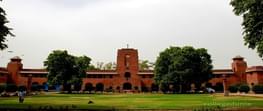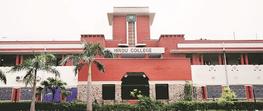Jamia Millia Islamia University MA Geography: Fees 2025, Course Duration, Dates, Eligibility
Course Description
- Visit the official website for admission registration via the online form (www.jmicoe.in).
- Click on the link “application form”.
- Fill the required details in the application form.
- Choose the Program(s) and Category.
- Attach the required photocopies of attested certificates/documents.
- Fee payment of INR. 700/- (non-refundable) via Credit Card/Debit Card/Net banking.
- Click on the “submit button” for the submission of filled-in application.
- A valid and readily accessible Email Id.
- Softcopy of candidate’s colored passport size photograph in JPG/JPEG format with White Background.
- Softcopy of the candidate’s signature in JPG/JPEG format.
- The candidate must log in with the required email and password for the admit card (after notification on the official website).
- Candidate must check the University website (http://jmi.ac.in, www.jmicoe.in) for admission related notices and other information.
- Email id
- Mobile no
- Scanned photo
- Scanned signature
- Credit card, Net banking or ATM-cum-Debit card
- Foreign Passport Holder (FPH)
- Application form duly filled in BLOCK LETTERS (In Original)
- Self Attested copies of Marks sheet of X and XII examination/Pre-University or equivalent class.
- Age proof.
- Self-attested copies of Marks sheet of Bachelor’s degree or equivalent degree
- Copy of valid passport and visa
- Application form duly filled in BLOCK LETTERS (in Original)
- Self-attested copies of X and XII class marks sheet or any equivalent examination
- Age proof
- Self-attested copies of marks sheet of Bachelor’s degree or equivalent degree
- Copy of the passport of parent working abroad
- Translated by the accredited authorized agency and self-attested copy of work permit/ license to work / valid working visa of parent
- Translated by the accredited authorized agency and self-attested copy of residence permit of parent
- Self-attested copy of the Letter from the employer of the parent abroad
- An affidavit on stamp paper of INR. 10/- from a parent for financial support.
- Self-attested Copy of the NRI Status Certificate issued by the Indian Embassy in the concerned country (Original required at the time of final admission)
Application Fees
| Faculty/Centre Offering the Program | Application Fee |
|---|---|
| AJK Mass Communication Research Centre | INR. 700/- |
| Centre for Management Studies | |
| Centre for Physiotherapy Rehabilitation Sciences | |
| Faculty of Architecture and Ekistics (Except B.Arch.) | |
| Faculty of Education | |
| Faculty of Engineering Technology (Except B.Tech.) | |
| Faculty of Dentistry | |
| Faculty of Law | |
| All other Faculties/Centres | INR. 550/- |
| B.Tech/B.Arch. | |
| M.Phil. and Ph.D. | INR. 1500/- |
NOTE- Requirements while registration of application form-
Required information in application form
Documents required (foreign students/NRIs)
Non-Resident Indian (NRI)
Eligibility Criteria
The candidate should have BA/BSc (Hons) Geography, three years course with not less than 50% aggregate OR BA/BSc with not less than 55% aggregate in Geography and 50% aggregate overall
Course Details
JMI offers full-time M.Tech., MBA, MCA and M.Arch. courses at postgraduate level.
The minimum eligibility criteria for M.Tech is a BE/B.Tech. degree in the relevant discipline. B.Arch is the minimum eligibility criteria for M.Arch courses and a Bachelor’s degree in the related discipline is required for MBA and MCA courses.
Students have to secure a valid score in JMI Entrance to become eligible for admission.
| Courses | Specializations | Eligibility Criteria | Selection Process |
|---|---|---|---|
| M.Tech. | Computer Engineering | BE/ B.Tech in Computer Engineering/ Computer Science/Information Technology with at least 60% marks. | Score in JMI Entrance Test followed by an Interview |
| Earthquake Engineering | BE/ B.Tech in Civil Engineering with at least 60% marks in aggregate | ||
| Control Instrumentation Systems | BE/ B.Tech in Electronics Engg./ Electronics Communication Engg./Electronics and Instrumentation with 60% marks in aggregate | ||
| Electrical Power System Management | |||
| Electronics Communication Engg. | |||
| Environmental Science Engg. | BE/B.Tech. in any relevant firld with a minimum of 60% marks | ||
| Mechanical Engineering | BE/ B.Tech in Mechanical Engg., Production Engineering, Automobile Engg., Manufacturing and Automation Engg with at least 60% marks in aggregate | ||
| Machine Design | |||
| Thermal Engg. | |||
| Production and Industrial Engg. | |||
| Nanotechnology | BE/ B.Tech in Electrical/ Mechanical/Electronics Communication/ Computer Engg./ Instrumentation with at least 60% marks in aggregate | ||
| M.Arch. | Architecture Pedagogy | B.Arch or equivalent UG degree with at least 50% marks in aggregate | |
| Building Services | |||
| Health Architecture | |||
| Recreation Architecture | |||
| Urban Regeneration | |||
| Ekistics | |||
| M.C.A | - | BCA/ B.Sc (IT/CS) with at least 50% marks | |
| M.B.A. | General | Any Bachelor’s degree with 50% marks in aggregate | |
| Entrepreneurship Family Business | |||
| International Business | |||
| Executive | Bachelor’s degree in any discipline or with at least 50% marks in aggregate. Three years of professional experience is mandatory. | ||
| Tourism Travel |
At postgraduate level, JMI offers M.A, M.Sc, M.Com, LL.M, M.F.A, MPT, M.Ed. and M.Li.I.Sc. programs. JMI conducts its own entrance test to provide admission in these programs. A bachelor’s degree in the relevant discipline is the minimum eligibility criteria for these programs.
| Courses | Specializations | Eligibility Criteria | Selection Process |
|---|---|---|---|
| M.A. | Sanskrit | BA (H) in Sanskrit/ Shastri with 50% marks in aggregate. | Entrance Test conducted by Jamia followed by an Interview or other admission formalities |
| Applied Psychology | BA/ B.Sc/ B.Com with at least 55% marks. | ||
| Arabic | |||
| Hindi | |||
| English | |||
| History | |||
| Economics | |||
| Media Governance | |||
| Mass Communication | |||
| Islamic Studies | |||
| Human Resource Management | |||
| Human Rights Duties Edu. | |||
| Public Administration | |||
| Education | |||
| Educational Planning Administration | Bachelor’s degree with at least 50% marks | ||
| Comparative Religion | 45% marks in Graduation | ||
| Gender Studies | 50% marks in Graduation | ||
| Conflict Analysis and Peace Building | |||
| Early Childhood Development | |||
| International Relations-West Asian Studies | UG/PG degree in Social Sciences or Humanities with a minimum of 45% marks at graduation level. | ||
| Persian | BA (H) in relevant discipline with 50% marks in aggregate. | ||
| Political Science | |||
| Politics: International Area Studies | |||
| Social Exclusion Inclusive Policy | |||
| Social Work | |||
| Sociology | |||
| Urdu | |||
| M.A. (Self Financed) | Convergent Journalism | Bachelor’s degree with 45% marks | |
| Development Communication | |||
| Visual Effect and Animation | |||
| M.A./M.Sc. | Development Extension | Bachelor’s degree with 45% marks | |
| Geography | |||
| Mathematics | B.A./B.Sc. with Mathematics having not less than 50% marks both in aggregate and in Mathematics | ||
| M.Sc. | Bioscience | B.Sc. in any area of Biosciences/Biotechnology with not less than 50% marks in aggregate. | |
| Biotechnology | |||
| Biophysics | |||
| Disaster Management and Climate Sustainability Studies | Bachelor’s degree in Geography/Environmental Science/Civil Engg with 55% marks | ||
| Electronics | B.Sc. degree with 55% marks | ||
| Mathematics with Computer Science | B.A./B.Sc. with Mathematics securing not less than 50% marks both in aggregate and in Mathematics. | ||
| Mathematics Education | |||
| Physics | B.Sc. with not less than 50% marks in aggregate and at least 55% marks in the subject concerned. | ||
| M.Sc. (Chemistry) | Materials | B.Sc. (H) Chemistry or B.SC. with not less than 50% marks in aggregate and at least 55% marks in Chemistry | |
| Inorganic | |||
| Organic | |||
| Physical Chemistry | |||
| M.Sc. (Self Financed) Evening | Biochemistry | B.Sc./B.Sc.(Hons.) with at least 50% marks in aggregate. | |
| Bioinformatics | |||
| Microbiology | |||
| M.Sc.Tech. (Self Financed) | Industrial Mathematics With Computer Application | ||
| M.Com. | Business Management | B.Com./BBS/BBA/BIBF with at least 55% marks | |
| L.L.M. | - | LL.B. with not less than 50% marks in the aggregate or equivalent grade points. | |
| Executive | |||
| M.Ed. | - | At least 50% marks B.Ed/BA-B.Ed/B.Sc-B.Ed or B.El.Ed. | |
| Special Education | B.A or B.Sc and 50% marks in B.Ed.(Special Education) in any of Visual Impairment or Learning Disabilities. | ||
| M.F.A. | Applied Art | BFA degree with at least 60% marks in aggregate | |
| Art Education | |||
| Art History Art Appreciation | |||
| Graphic Art | |||
| Painting | |||
| Sculpture | |||
| M.Lib.I.Sc | - | B.Lib.I.Sc with 50% marks in aggregate | |
| M.P.T. | Sports | Bachelor in Physiotherapy (4½ years duration) with minimum of 50%marks. | |
| Orthopaedics | |||
| Cardiopulmonary | |||
| Neurology | |||
| MTTM | - | Degree in BTTM | |
| MHM | - | Bachelors of Hotel Management with atleast 45% marks |
Selection Process: Admission to all the PG level programs will be done on the basis of the JMI entrance test.
The candidates will be selected on the basis of entrance examination including group discussion/interview conducted by the university.
Entrance test- The syllabi for Entrance Tests along with the structure of the question paper and other necessary details are available on the university’s official website.
Conduct of interview- Candidate must have more than 30% marks in the descriptive part of the Entrance Test for interview/admission.
Entrance test result- The rank list is prepared on the basis of candidate’s performance in entrance test, reservation and relaxation criteria of the university.
Document verification and submission- Selected candidates must complete their admission formalities on or before the date notified as per the Admission Schedule provided in the Admission List.
Payment of admission fee- Payment of admission fee is via cash, online or demand draft drawn in favor of “The Registrar, Jamia Millia Islamia”, payable at NewDelhi.
Note: For M.Tech/MBA/MCA, the entrance test includes a written test, Group Discussion/ Interview.
JMI also offers PG Diploma in Part-Time, Self-Financed and Regular modes. Candidates must possess relevant qualifications to be considered eligible for admission.
| Courses | Specializations | Eligibility Criteria | Selection Process |
|---|---|---|---|
| PG Diploma | Computer Applications | UG degree with 50% marks | Entrance Test conducted by Jamia followed by an Interview or other admission formalities |
| Iranology (Part-time) | |||
| Labour Law | |||
| Air Space Law | |||
| Disaster Management | |||
| Entrepreneurship, Innovation and Design Thinking | Bachelor’s degree with 55% marks | ||
| Remote Sensing GIS Application | B.A./B.Sc. with 50% marks | ||
| Urdu Mass Media | 55% marks in B.A. Urdu | ||
| PG Diploma (Self-Financed) | Acting | Graduation | |
| Broadcast Technology | Bachelor’s degree with 50% marks | ||
| Educational Management | |||
| Journalism (Hindi Medium) | Bachelor’s degree with 45% marks | ||
| Still Photography Visual Communication | UG degree with 50% marks |
Selection Process: Admission will be granted on the basis of the candidate’s performance in the entrance exam followed by an interview.
| Year (2021 - 2022) | 1 | 2 |
|---|---|---|
| Tuition fees | ₹7800 | ₹7800 |
| Yearly Fees | ₹7,800 | ₹7,800 |
Jamia Millia Islamia University Master of Arts [MA] (Geography) Ranking

Do you think the Rankings are wrong ? Report Here
Course Finder
Search from 20K+ Courses and 35+ Streams
Popular Streams:
Discover More Colleges
![Lady Shri Ram College for Women - [LSR]](https://image-static.collegedunia.com/public/college_data/images/appImage/14918218951444135101LSRCNEW.jpg?h=111.44&w=263&mode=stretch)





![Jawaharlal Nehru University - [JNU]](https://image-static.collegedunia.com/public/college_data/images/appImage/25461_JNU.jpg?h=111.44&w=263&mode=stretch)

![Dyal Singh College - [DSC]](https://image-static.collegedunia.com/public/college_data/images/appImage/1239_DSC_New.jpg?h=111.44&w=263&mode=stretch)




![Jamia Millia Islamia University-[JMI]](https://image-static.collegedunia.com/public/college_data/images/logos/1491558776logo.jpg?h=71.7&w=71.7&mode=stretch)















![Department of Tourism, Hotel, Hospitality and Heritage Studies, JMI - [DTHHHS]](https://image-static.collegedunia.com/public/college_data/images/logos/1519733424Capture11.png?h=72&w=72&mode=stretch)


![Jadavpur University - [JU]](https://image-static.collegedunia.com/public/college_data/images/logos/college-logo.png?h=72&w=72&mode=stretch)
![Acharya Nagarjuna University - [ANU]](https://image-static.collegedunia.com/public/college_data/images/logos/15087556111394863761AcharyaNagarjunaUniversity.png?h=72&w=72&mode=stretch)
![Lady Shri Ram College for Women - [LSR]](https://image-static.collegedunia.com/public/college_data/images/logos/1559556886lsrlogo9.jpg?h=72&w=72&mode=stretch)
![Aligarh Muslim University - [AMU]](https://image-static.collegedunia.com/public/college_data/images/logos/1504180374logo.jpg?h=72&w=72&mode=stretch)
![University of Hyderabad - [UOH]](https://image-static.collegedunia.com/public/college_data/images/logos/15090869991480683061uohimage.jpg?h=72&w=72&mode=stretch)

![Panjab University - [PU]](https://image-static.collegedunia.com/public/college_data/images/logos/15040653671413791580PunjabUniversityChandigarhPU.jpg?h=72&w=72&mode=stretch)

![Dyal Singh Evening College - [DSEC]](https://image-static.collegedunia.com/public/college_data/images/logos/1491914314logo.png?h=72&w=72&mode=stretch)
![Gargi College - [GC]](https://image-static.collegedunia.com/public/college_data/images/logos/1506399496zsdmnnmnmsdfdf.png?h=72&w=72&mode=stretch)
![Dyal Singh College - [DSC]](https://image-static.collegedunia.com/public/college_data/images/logos/13957264961.png?h=72&w=72&mode=stretch)
![Daulat Ram College - [DRC]](https://image-static.collegedunia.com/public/college_data/images/logos/1507912339daulatramcollegelogo.png?h=72&w=72&mode=stretch)
![Banaras Hindu University - [BHU]](https://image-static.collegedunia.com/public/college_data/images/logos/1434627772BHU.jpg?h=72&w=72&mode=stretch)
![Dr. Bhim Rao Ambedkar College - [BRAC]](https://image-static.collegedunia.com/public/college_data/images/logos/1492411231logo.png?h=72&w=72&mode=stretch)




Comments